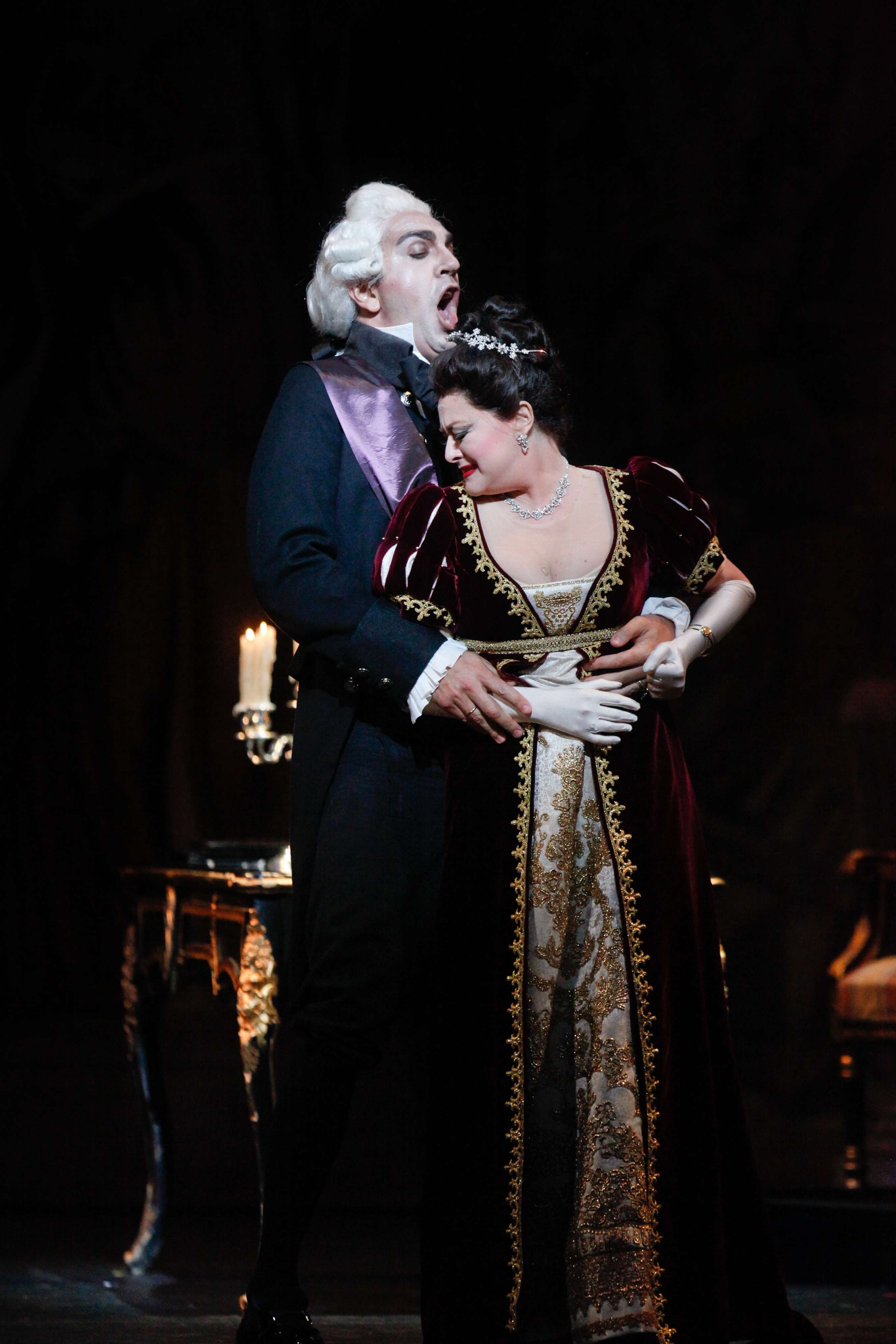|
Back
Sexy Sopranos Shine! Palm Beach
Kravis Center for the Performing Arts
03/25/2011 - & March 26, 27, 28*, 2011
Giacomo Puccini: Tosca
Chiara Taigi (Tosca), Riccardo Massi (Cavaradossi), Claudio Sgura (Scarpia), Matthew Burns (Angelotti), Matteo Peirone (Sacristan), Evanivaldo Correa Serrano (Spoletta), Kenneth Stewart (Sciarrone), Greta Ball (Shepherd Boy)
Palm Beach Opera and Chorus, Greg Ritchey (chorus master), Bruno Aprea (conductor)
Massimo Gasparon (director), David P. Gordon (scenic design), Ray Diffen (costume design), Joseph P. Oshey (lighting design)

C. Taigi & C. Sgura (Courtesy of PBO)
Palm Beach Opera closed its season with Tosca. This brutal melodrama seldom fails, and how refreshing when a production decides to avoid any new twists and just tells the story in all its gory fun! Though it ends with an unhappy wallop, Tosca is not a depressing opera. The leads are killed by murder, then execution, then suicide. Yet the lovers die with dignity and there is something undeniably rewarding about the grisly demise of the villain.
What a rewarding experience it is to revisit Tosca after an absence of a few seasons. This is arguably opera’s sexiest; and though other Puccinis can match its second act in intensity, none surpasses it in shock value. It is hard to imagine a better opportunity for a novice operagoer. Tosca is a work that is so solid musically and well written, that, unlike, for example, Turandot, it doesn’t require a lavish production to succeed.
Palm Beach Opera borrowed Sarasota Opera’s unfussy production and except for the inability for half the audience seeing Tosca make her final leap, it works most efficiently. There are moments that are particularly effective such as having Mario write his final message to his beloved while still lying on the floor, not at some comfortable desk with appropriate implements. Yet at other times, like after the shepherd’s song, it seems lazy not to take advantage of all those beautiful orchestrations Mr. Puccini created in order to have some minimal stage activity.
But a great production of Tosca is about the three leads. Palm Beach had varying results with its two casts. Riccardo Massi’s Cavaradossi has the notes and the power. “Recondita armonia” and “E lucevan le stelle” are solid and his full throttled and long “Vittoria!” in the second act was a knockout. But his Mario never seems connected to the action. In the first act Tosca’s jealousy seems perfectly merited since her lover appears to be completely uninterested in this very sexy, loving and passionate woman. In the second cast, on the 27th , Warren Mok did not have Massi’s power or beauty but was completely committed to the character and his moments with Tosca were scorching.
Though Claudio Sgura’s is a clean sounding Scarpia, he doesn’t seem to get the important menace of this evil character. If he is a pushover for Tosca, who really is a tough dame when necessary, the fear is gone. Without these sparks, the second act isn’t what it should be. Stephen Powell’s second cast Scarpia was a villain not to mess with. Powell’s voice is pure and exacting; therefore, Scarpia is a monster who knows exactly what he wants and is used to getting it. As a result, when Tosca turns the tables on him, she is even more heroic.
Tosca can be a thankless role. The men often get all the applause and our title character has to overextend her voice to be noticed. Chiara Taigi is a Tosca from the old school. Hers is a gorgeous voice that never screeches; she is also an actress in complete control of her audience. Command like this is not so typical anymore: a diva in overdrive, just what this opera demands. Her only flaw was to break character after a stunning “Vissi d’arte” in order to acknowledge applause. Mamma Rose’s axiom “Make ‘em beg for it, and don’t give it to them!” is essential not to lose the tension of this incredibly powerful moment and Ms. Taiga would be wise to memorize it. It is, however, easy to forgive a Tosca this sexy and overwhelming. The long applause she was given at the final curtain was well deserved. American Tiffany Abban in the second cast was hardly less stunning. Her approach to the role is more reserved, less diva-like, but no less solid. The voice has a Leontyne Price-like smokiness and her presence is that of a confident and very steamy lady. Taigi and Abban should have major careers in the United States. Often time people are wary of second casts, but overall, with this production, the second cast had chemistry that was lacking in the first.
The smaller roles were all well-handled though special mention should be paid to Greta Ball’s Shepherd. This short piece was given the care and emotion of a big aria. Let’s hope Ms. Ball gets a larger role soon.
And what drives such good performances at Palm Beach Opera? Naturally, the conductor, Bruno Aprea. The orchestra is always sensitive, elegant when necessary and never blaring. The singers do not have to strain to make themselves heard in a large house. Aprea is working with them; he isn’t trying to be the star. As a result, there are an unusually great number of fine productions of varied material. South Florida does seem to have drifted away from the German repertoire. Perhaps in economically strapped times, it is the Italian works that sell tickets. But for Aprea to do one of the Italian-style Wagners, like Lohengrin, would probably be popular, not only with South Floridians but also might create more tourism.
Jeff Haller
|